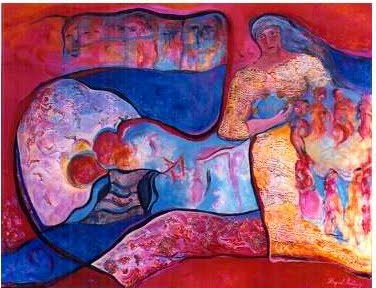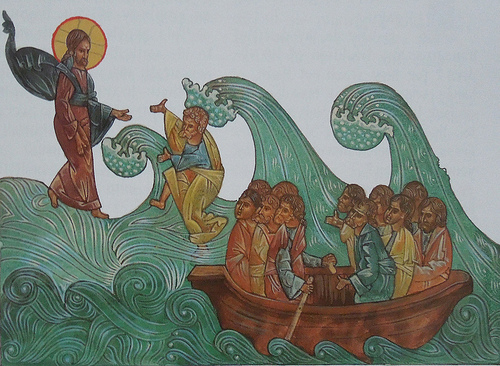 Exodus 1:8-2 – 2:10
Exodus 1:8-2 – 2:10
Psalm 124, Isaiah 51:1-6, Psalms 138
Romans 12: 1-8
Matthew 16:13-20
In the place called Caesarea Philippi, so called to honor the Roman Emperor Jesus spent the time to do “research” on the perception of his disciples and others about him.
His first question was, “Who do people say that the Son of Man is?” Disciples answered John the Baptist, Elijah, Jeremias – the prophets of Jews.
Yet most of the people knew Jesus as a different person, not the Messiah that his disciples known about. It was because Jesus possesses no grandeur in which they supposed the Messiah was to appear.
The second question was, “but who do you say that I am”.
Jesus didn’t make the inquiry because he is ignorant of what they thought about him but because he wanted to know what kind of impression did they have on him. Simon Peter witnessed what Jesus did in his ministry. You are the Christ, Simon Peter answered. This also served as an affirmation of disciples’ faith in him in the midst of controversies from Pharisees and Roman Empire.
Since then Jesus blessed the church through Simon Peter. In the tradition, Peter is considered the first Pope.
We have a long history as a church, the contradictions help the church to furnish itself through time. This inquiry of Jesus to his disciples can help us to contemplate on our identity from the people we serve. Who do we say the church is? Who do we say we are?
I am a youth from United Methodist Church, under a lay organization called United Methodist Youth Fellowship (UMYF). We have this common motto “Si Kristo ay Higit sa lahat” or Christ above all. You may hear this motto in the reports, sermons, and activities of UMYF. The question of Jesus “but who do you say that I am,” Simon Peter answered him with big faith and based on what he had witness of Jesus. As a church we are called to be a witness of Christ’s salvation to the people. This is how Jesus came to serve and not to be served. He came that the people may have abundant life and may the people who needed God the most may experience God’s prevenient love. “Si Kristo’y Higit sa Lahat” (Christ above all) is actually emptying ourselves to serve. This actually is a reminder to all that it is not about us, it is about the mission of Christ above ourselves. Rev. Tin the youth coordinator of national UMYF actually quoted it “Others above all,” pointing that the others are the people who we should serve.
It is heart breaking to hear the news about another minor shot dead under the Oplan Double Barrel Reloaded. Where does abundant life manifest in these events? Where’s the church? It is not the issue that minors too are guilty of abusing drugs. It is the issue of handling this problem. I was 17 years old when I started to make serious choices – where to go in college and what course to take up. I was seeking wisdom from elders to give me a bird’s eye-view of the life of an “adult”.
At least, I was able to ask the questions and had an opportunity to be enrolled in a university and get a course. I am still alive, and in some ways, enjoying the work that I do. Unlike Kian, who, in spite of having dreams and is trying hard to get a schooling, his young life, has been stolen from him and from his family and community. He was killed in the name of war on drugs.
Perhaps there are many Kians in our society. I wonder, how the Kians perceive the church?
At this point, some questions linger on : How does the church denounce the evils in the society? How do we proclaim the Good News of Christ for the people? What could be the perception of the victims and of the poor about the church and its role in society?
We can ponder upon on the statement of the World Council of Churches statement on Mission and Evangelism in Changing Landscape:
“Mission from the margins seeks to counteract injustices in life, church, and mission. It seeks to be an alternative missional movement against the perception that mission can only be done by the powerful to the powerless, by the rich to the poor, or by the privileged to the marginalized. Such approaches can contribute to oppression and marginalization.”
We repel people from us or church if they feel we don’t understand their struggles.
Christ above all!
Others above ourselves,
Serve the people! ##
Ms. Hannah Grace Santillan
United Methodist Youth Fellowship &
Kalipunan ng Kristianong Kabataan sa Pilipinas
photoggrab from:https://lentenmuse.wordpress.com/2017/03/08/who-do-you-say-that-i-am/


 Isaias 56:1, 6-8/Awit 67
Isaias 56:1, 6-8/Awit 67 Genesis 37:1-4, 12-28
Genesis 37:1-4, 12-28